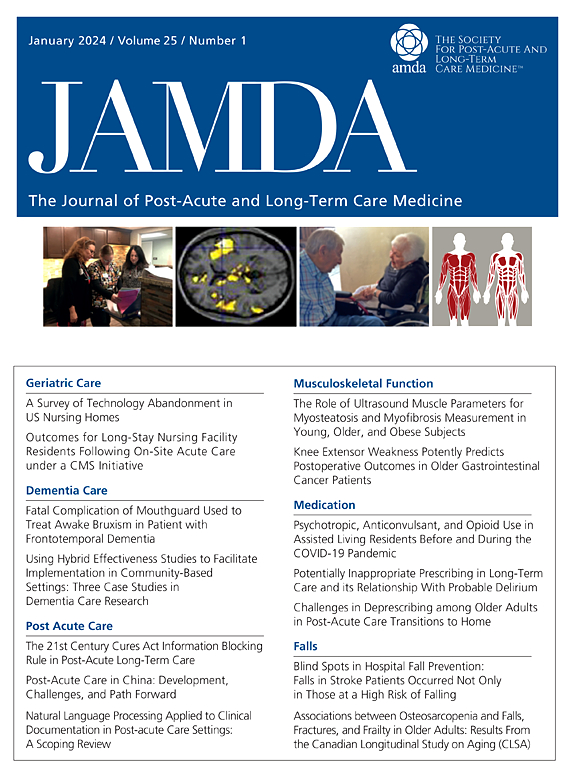The Relationship Between Frailty and Psychological Functioning in Community-Dwelling Older Adults: A Systematic Review
IF 3.8
2区 医学
Q2 GERIATRICS & GERONTOLOGY
Journal of the American Medical Directors Association
Pub Date : 2025-06-14
DOI:10.1016/j.jamda.2025.105707
引用次数: 0
Abstract
Objectives
Frailty and poor psychological functioning remain major aging-related public and clinical health challenges. The multidimensional nature of these constructs, along with diverse assessment methods, complicate the study of their relationship. This study aims to examine the cross-sectional and longitudinal relationships between frailty and psychological functioning and explore how their interplay affects health-related outcomes in community-dwelling older adults.
Design
Systematic review.
Setting and Participants
Community-dwelling older adults.
Methods
We conducted a systematic search of MEDLINE, Embase, Emcare, PsycINFO, CINAHL, Web of Science, and Scopus for English-language articles published between January 2001 and November 2024. Two authors independently screened studies, extracted data, and performed quality assessment. Data were analyzed descriptively.
Results
A total of 129 studies were included, covering 113 distinct cohorts of community-dwelling older adults from 37 countries. Cross-sectional analyses consistently found positive associations between frailty and depression, psychological distress, and apathy, and negative associations with mental well-being, optimism, and sense of coherence, with mixed findings for anxiety. Longitudinal studies showed that baseline depression, apathy, and poor mental vitality predicted frailty progression, while frailty at baseline predicted incident depression and worsened mental health. The interaction between frailty and depression was associated with poorer health outcomes, including increased mortality, functional disability, and hospitalization risks.
Conclusions and Implications
Community-based frailty management strategies should consider a broader range of psychological factors, such as mental vitality, apathy, and mental well-being. Further research is needed to explore additional psychological dimensions beyond depression and anxiety, and their relationship with frailty and aging-related health outcomes.
社区老年人脆弱与心理功能的关系:一项系统综述。
目的:虚弱和心理功能不良仍然是与老龄化相关的主要公共和临床健康挑战。这些结构的多维性,以及不同的评估方法,使它们之间关系的研究复杂化。本研究旨在检验脆弱和心理功能之间的横断面和纵向关系,并探讨它们的相互作用如何影响社区居住老年人的健康相关结果。设计:系统回顾。环境和参与者:社区居住的老年人。方法:系统检索MEDLINE、Embase、Emcare、PsycINFO、CINAHL、Web of Science和Scopus,检索2001年1月至2024年11月间发表的英文论文。两位作者独立筛选研究,提取数据,并进行质量评估。对数据进行描述性分析。结果:总共纳入了129项研究,涵盖了来自37个国家的113个不同的社区居住老年人队列。横断面分析一致发现,虚弱与抑郁、心理困扰和冷漠呈正相关,与心理健康、乐观和连贯感呈正相关,而与焦虑的关系则好坏参半。纵向研究表明,基线抑郁、冷漠和精神活力差预示着虚弱的进展,而基线虚弱预示着抑郁和心理健康的恶化。虚弱和抑郁之间的相互作用与较差的健康结果相关,包括死亡率增加、功能残疾和住院风险。结论和意义:基于社区的脆弱性管理策略应考虑更广泛的心理因素,如心理活力、冷漠和心理健康。需要进一步的研究来探索抑郁和焦虑之外的其他心理维度,以及它们与虚弱和衰老相关健康结果的关系。
本文章由计算机程序翻译,如有差异,请以英文原文为准。
求助全文
约1分钟内获得全文
求助全文
来源期刊
CiteScore
11.10
自引率
6.60%
发文量
472
审稿时长
44 days
期刊介绍:
JAMDA, the official journal of AMDA - The Society for Post-Acute and Long-Term Care Medicine, is a leading peer-reviewed publication that offers practical information and research geared towards healthcare professionals in the post-acute and long-term care fields. It is also a valuable resource for policy-makers, organizational leaders, educators, and advocates.
The journal provides essential information for various healthcare professionals such as medical directors, attending physicians, nurses, consultant pharmacists, geriatric psychiatrists, nurse practitioners, physician assistants, physical and occupational therapists, social workers, and others involved in providing, overseeing, and promoting quality

 求助内容:
求助内容: 应助结果提醒方式:
应助结果提醒方式:


